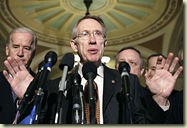 The Senate failed to proceed with the Climate Security Act (S. 3036), legislation intended to develop a cap-and-trade system to substantially reduce carbon emissions. The method would allow entities with carbon-emitting sources to upgrade facilities or adopt new and improved technologies to contain emissions. After a motion to close debate failed, Majority Leader Harry Reid (D-Nev.) pulled the bill and moved on to other business, essentially ending further consideration of the bill in the current session.
The Senate failed to proceed with the Climate Security Act (S. 3036), legislation intended to develop a cap-and-trade system to substantially reduce carbon emissions. The method would allow entities with carbon-emitting sources to upgrade facilities or adopt new and improved technologies to contain emissions. After a motion to close debate failed, Majority Leader Harry Reid (D-Nev.) pulled the bill and moved on to other business, essentially ending further consideration of the bill in the current session.
The bill, sponsored by Sens. Joe Lieberman (I-Conn.) and John Warner (R-Va.), limits emissions from coal-burning power plants and factories, natural gas processors and importers, petroleum refiners and importers, and large industrials. In essence, it restricts the supply of fossil fuels in order to favor conservation and non-carbon-emitting energy sources, including nuclear energy.
Environmental Protection Agency analyses of the bill “demonstrate the importance of key enabling technologies, specifically [carbon capture and sequestration] and nuclear power.”
Sen. James Inhofe (R-Okla.), who does not support the bill, asserted that, “There can be a relationship between CO2 and a warming condition, but it’s not major.”
Sen. Barbara Boxer (D-Calif.), who managed the bill on the Senate floor last week, said the legislation is “about saving us. It’s about saving our future. It’s about saving the life on planet Earth. And, yes, it is about saving God’s creatures.”
A cap-and-trade regime creates an emission limit, or cap, in an amount initially 4 percent below the estimated carbon emissions produced in 2005. Companies that adopt technologies that reduce their carbon emissions can sell, or “trade,” their excess allowance on the open market to companies that cannot remain within the level set by their caps.
The cap adjusts downward by about 2 percent each year after 2012. Reductions would reach about 19 percent by 2020 and, ultimately, 71 percent by 2050. The annual adjustment increases the value of the carbon allowances, providing companies with an incentive to reduce their emissions to profit from the allowances they can then sell.
Debate halted Wednesday when Sen. Mitch McConnell (R-Ky.) requested that the full text of the 456-page bill be read aloud on the Senate floor. McConnell said his request was a protest over Senate inaction on President Bush’s judicial nominees. Debate resumed Thursday.
The bill faces opposition from the White House. The Bush administration said the bill could trade a possible ecological disaster for a likely economic one. “S. 3036 is likely to severely damage the economy and drive jobs overseas,” the administration’s statement said. “As an example, the Environmental Protection Agency and the Energy Information Administration have estimated, respectively, that the bill as reported could reduce U.S. gross domestic product by as much as 7 percent (over $2.8 trillion) in 2050, and reduce U.S. manufacturing output by almost 10 percent in 2030—before even half of the bill’s required reductions have taken effect.”
The strong objections from the Bush administration led some key senators to conclude that the debate and the bill’s proposed amendments could provide a framework that allows its sponsors to reintroduce it next year after a new president is elected.
“However far we take it, it is very important to start now,” said Boxer, who chairs the Senate Environment and Public Works Committee.
The presumptive nominees of both major parties, Sen. John McCain (R-Ariz.) and Sen. Barack Obama (D-Ill.), support the concept of cap-and-trade, with Obama stating he would favor more steeply incremented caps. He also prefers an auction for all carbon permits, creating in effect a carbon tax. McCain stresses the “pursuit of alternatives to carbon-based fuels” and said the cap-and-trade system favors the creation or accelerated use of technologies that can contain emissions. Among these technologies, McCain includes nuclear energy, carbon capture and sequestration and battery development.
This is original reporting and will appear in slightly different form in Nuclear Energy Overview, NEI's weekly member newsletter.
Picture of Harry Reid. This bill will likely be back in revised form in the next session of Congress. But it appears our week of Lieberman-Warner was, this time, really just a week.
Comments
Harry Reid (R-N.M.)
He's Democrat, right?